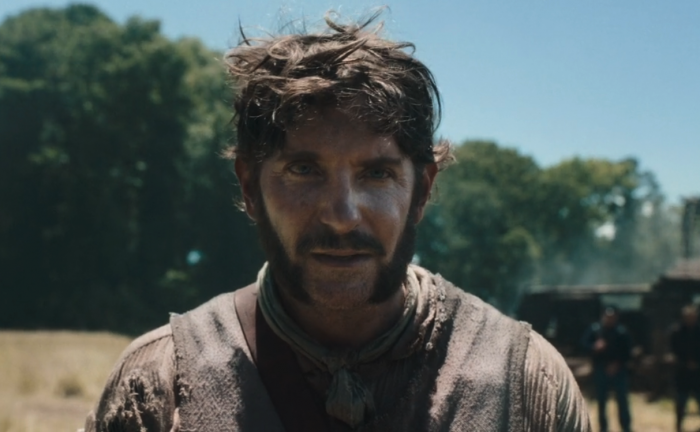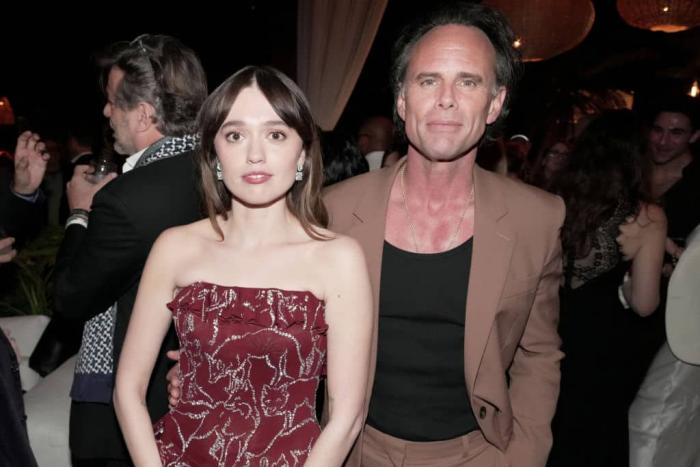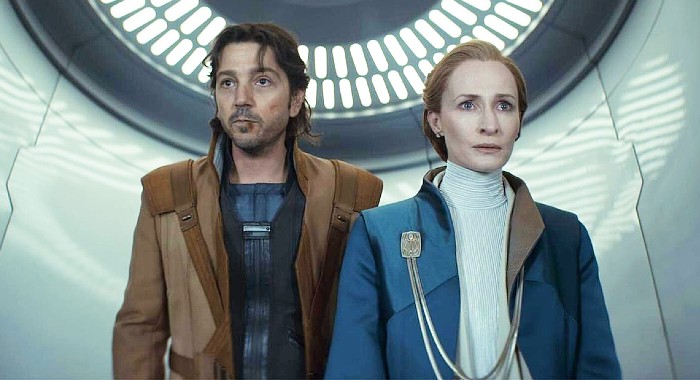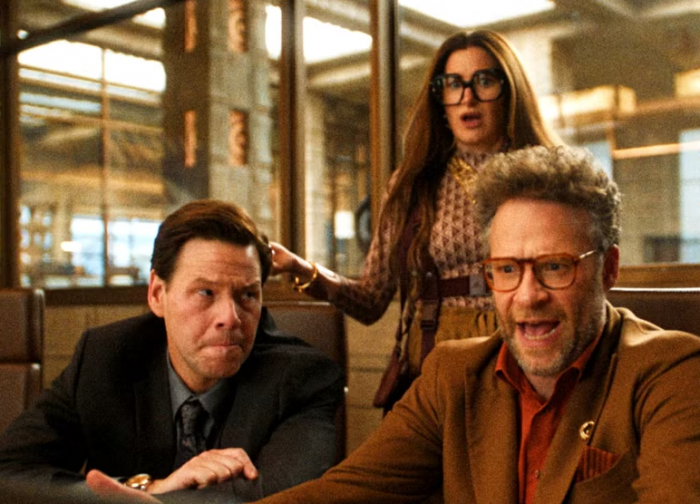
Review: 'Good Omens' Finds Fun And Friendship At The End Of The World
By Tori Preston | Streaming | June 1, 2019
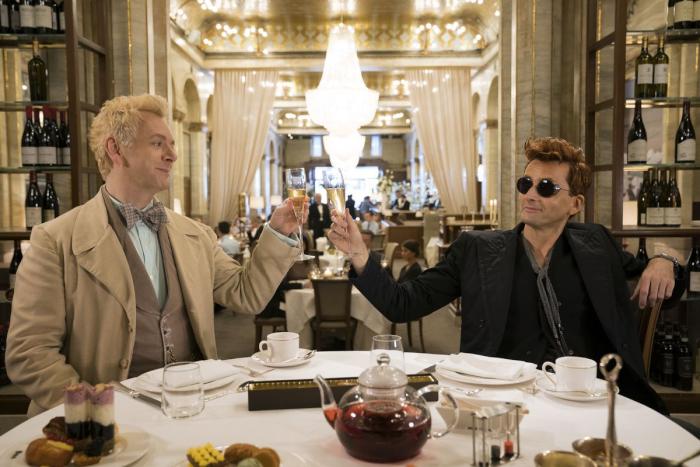
Few shows have been so obsessively catalogued, and yet wrapped in mystique, as Good Omens. I mean, yes sure there was Game of Thrones, but that show had eight seasons to build its audience’s obsession to a crescendo. By contrast, Neil Gaiman has almost singlehandedly ushered his passion project to our screens through 18 months of interviews, behind-the-scenes sneak peeks on social media, and the kinds of casting announcements that make even the most disinterested of us sit up and pay attention. Add to that the fact that the Amazon Prime limited series is based on the beloved novel that Gaiman wrote with Terry Pratchett — a novel with its own eager fanbase built-in — and has a devilishly addictive hook (“The End of the World, But Make It Funny”), and it’s no wonder anticipation and expectations ran high with this one. The only question is: Did it live up to the hype?
And thankfully the answer is yes, for the most part. So let me dispense with the bad news first. Fans of the novel may notice that, while the show is for the most part very faithful to the book, some of their favorite bits are missing, or reduced. There’s a lot less focus on the signs of the coming Apocalypse, for example, and I for one found myself missing that final tearjerker of a coda (“If you want to imagine the future, imagine a boy and a dog and his friends…”), if only because I think Frances McDormand (narrating as God) would have knocked it out of the park. But what you miss, and why you miss it, will be very personal — and for the most part I think even if you’re disappointed that something you love didn’t make the cut, you’ll understand why it didn’t. It was sacrificed for a greater good, and in my mind the additions to this 6-episode adaptation far outweigh the bits that have been lost. Gaiman wrote all the scripts, he was the showrunner, and he knew what he was doing in crafting this version.
On the flip side, viewers who are new to the story may find themselves at a bit of a loss at some points. This is a madcap adventure with a lot of moving parts, all crashing gloriously together in time for Armageddon, but sometimes it’s easy to lose track of those individual threads along the way if you aren’t already familiar with the tapestry as a whole. This is hardly a fatal flaw, since the proceedings are light and airy enough that you’ll happily be swept along with the flow regardless — and, if I’m being honest, part of the reason it might be harder to follow what exactly is happening with some of the threads is because all of your attention will be caught by one of the threads in particular.
And here’s where I get to the parts of Good Omens that do work, and work splendidly. Namely: Michael Sheen as the angel Aziraphale, and David Tennant as the demon Crowley. The show, as a whole, is very good. But even if it wasn’t, it would be entirely redeemed by these characters, these actors, and every single one of their scenes. The majority of the deviations Gaiman has crafted into this adaptation are specifically designed to flesh out their relationship and storyline, and even though I am a fan of the book, I was delighted to discover that these additions were absolutely the best part of the show. Flashbacks reveal the growing camaraderie between the bookish angel and his swaggering counterpart through the millennia, as their relationship builds from professional courtesy to genuine affection. They may serve different head offices, but as representatives of the Powers That Be that have been working on Earth since the beginning and have essentially gone native during their time here, Aziraphale and Crowley have far more in common than even they might care to admit. And chief amongst those shared traits is an affinity for life amongst the humans — and a reticence to see it all end in fire and brimstone.
Their friendship is canon, but the depth of their feeling for each other is something unique to the show. Honestly, my biggest takeaway after watching it was that theirs might be the only on-screen romantic pairing I’m invested in right now, even if it is an entirely platonic bromance.
Yes, a great deal of Good Omens concerns the team-up of Crowley and Aziraphale to stop the machinations of Heaven and Hell, thwart the Apocalypse, and preserve the comfortable life full of classic cars, good tunes, and sushi to which they’ve grown accustomed. But they are hardly the only forces at play in this comedic Armageddon. There’s a mysteriously misplaced antichrist named Adam (Sam Taylor Buck), who is destined to lead the Four Horsemen sometime around his eleventh birthday, if he isn’t too busy leading his own ragtag group of young friends around. Then there’s the Four Horsemen themselves: War (Mireille Enos), Famine (Yusuf Gatewood), Pollution (Lourdes Faberes), and Death (voiced by Brian Cox). There’s the occultist/professional descendent Anathama Device (Adria Arjona), whose role in these end times has been foretold in the big book of Nice and Accurate Prophecies her ancestor, a witch named Agnes Nutter, left her (and if anyone listened to the BBC Radio dramatization of Good Omens from 2014, you’ll be pleased to see Josie Lawrence reprising the role of Agnes!). There’s a young Witchfinder Army recruit named Newton Pulsifer (Jack Whitehall), who is far more interested in having a job than in finding witches. Then there’s Newton’s boss, the blustery Shadwell (Michael McKean), and Shadwell’s landlady, Madame Tracy (Miranda Richardson), a woman of many talents and endless patience.
Look, I’m barely scratching the surface of the characters that cross paths in this show — and I haven’t even mentioned Jon Hamm’s turn as the gleefully obtuse archangel Gabriel! Part of the balancing act Gaiman achieves in skewing the plot to focus more on Crowley and Aziraphale is to flesh out their Heavenly and Hellish colleagues, and offer more insight into the stakes at play when an angel and a demon go against The Great Plan. Good Omens has a unique take on the forces of Good and Evil: they’re mostly disconnected managers spinning their wheels in a bureaucratic rat race they do not comprehend. They are just doing their job, and their job, as far as they can tell, is to prepare for the final war between Heaven and Hell. The Apocalypse, to them, is merely the starting bell — and the end of the world is both a necessary sacrifice and a foregone conclusion. What sets Aziraphale and Crowley apart isn’t just their time on Earth or their affection toward humanity — it’s their perspective. Demons are just angels that fell, after all. They see, better than anyone on either side, that neither side is all that different. They aren’t just thwarting the Apocalypse, but questioning the underpinnings of their natural order.
And in the end, that’s what made Good Omens so palatable to me. Don’t get me wrong — this is a fun, funny, deliriously quirky confection, filled with cameos and clever easter eggs. It’s beautiful to watch, thanks in no small part to director Douglas Mackinnon, who helmed all six episodes, and the music from composer David Arnold is pitch-perfect for the proceedings. This is the complete package, without a doubt. But the fact is that it’s hard right now to laugh about the idea of the end of the world because it doesn’t feel that far-fetched. And the more I watched, the more I worried that, though Gaiman pulled off an impressive feat just getting this show made at all, maybe now wasn’t the right time for it. What value is there in a story about human nature trumping the forces of Good and Evil, when we’re the source of all that’s Good AND Evil in the world already — and it feels like we’re on the verge of destruction as we speak? But Gaiman knew what he was doing when he pivoted the story to focus more on Crowley and Aziraphale, and it wasn’t just to capitalize on the insane chemistry of Tennant and Sheen. The fact is, we all could use a reminder that we have more in common with our enemies than we might recognize. A reminder that our differences are often cosmetic, that Good and Evil are a matter of perspective, and that the things that are worth fighting for aren’t grand designs from distant leaders but our own personal slices of happiness — and each other. Good Omens might seem like an almost too-simplistic guilty pleasure — a throwback to a less complicated era — but it’s exactly the kind of story we need right now. It’ll give you some faith in humanity again.
